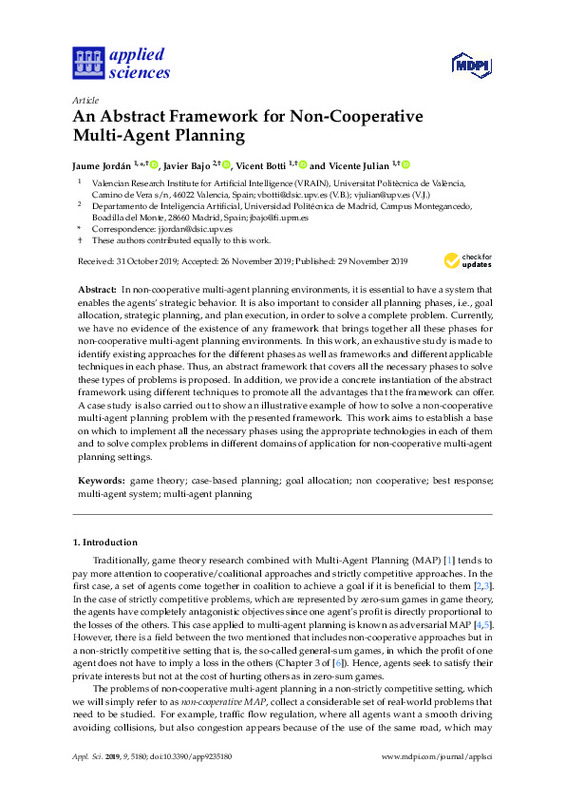De Weerdt, M., & Clement, B. (2009). Introduction to planning in multiagent systems. Multiagent and Grid Systems, 5(4), 345-355. doi:10.3233/mgs-2009-0133
Dunne, P. E., Kraus, S., Manisterski, E., & Wooldridge, M. (2010). Solving coalitional resource games. Artificial Intelligence, 174(1), 20-50. doi:10.1016/j.artint.2009.09.005
Torreño, A., Onaindia, E., Komenda, A., & Štolba, M. (2018). Cooperative Multi-Agent Planning. ACM Computing Surveys, 50(6), 1-32. doi:10.1145/3128584
[+]
De Weerdt, M., & Clement, B. (2009). Introduction to planning in multiagent systems. Multiagent and Grid Systems, 5(4), 345-355. doi:10.3233/mgs-2009-0133
Dunne, P. E., Kraus, S., Manisterski, E., & Wooldridge, M. (2010). Solving coalitional resource games. Artificial Intelligence, 174(1), 20-50. doi:10.1016/j.artint.2009.09.005
Torreño, A., Onaindia, E., Komenda, A., & Štolba, M. (2018). Cooperative Multi-Agent Planning. ACM Computing Surveys, 50(6), 1-32. doi:10.1145/3128584
Fikes, R. E., & Nilsson, N. J. (1971). Strips: A new approach to the application of theorem proving to problem solving. Artificial Intelligence, 2(3-4), 189-208. doi:10.1016/0004-3702(71)90010-5
Hoffmann, J., & Nebel, B. (2001). The FF Planning System: Fast Plan Generation Through Heuristic Search. Journal of Artificial Intelligence Research, 14, 253-302. doi:10.1613/jair.855
Dukeman, A., & Adams, J. A. (2017). Hybrid mission planning with coalition formation. Autonomous Agents and Multi-Agent Systems, 31(6), 1424-1466. doi:10.1007/s10458-017-9367-7
Hadad, M., Kraus, S., Ben-Arroyo Hartman, I., & Rosenfeld, A. (2013). Group planning with time constraints. Annals of Mathematics and Artificial Intelligence, 69(3), 243-291. doi:10.1007/s10472-013-9363-9
Guo, Y., Pan, Q., Sun, Q., Zhao, C., Wang, D., & Feng, M. (2019). Cooperative Game-based Multi-Agent Path Planning with Obstacle Avoidance*. 2019 IEEE 28th International Symposium on Industrial Electronics (ISIE). doi:10.1109/isie.2019.8781205
v. Neumann, J. (1928). Zur Theorie der Gesellschaftsspiele. Mathematische Annalen, 100(1), 295-320. doi:10.1007/bf01448847
Mookherjee, D., & Sopher, B. (1994). Learning Behavior in an Experimental Matching Pennies Game. Games and Economic Behavior, 7(1), 62-91. doi:10.1006/game.1994.1037
Ochs, J. (1995). Games with Unique, Mixed Strategy Equilibria: An Experimental Study. Games and Economic Behavior, 10(1), 202-217. doi:10.1006/game.1995.1030
Applegate, C., Elsaesser, C., & Sanborn, J. (1990). An architecture for adversarial planning. IEEE Transactions on Systems, Man, and Cybernetics, 20(1), 186-194. doi:10.1109/21.47820
Sailer, F., Buro, M., & Lanctot, M. (2007). Adversarial Planning Through Strategy Simulation. 2007 IEEE Symposium on Computational Intelligence and Games. doi:10.1109/cig.2007.368082
Willmott, S., Richardson, J., Bundy, A., & Levine, J. (2001). Applying adversarial planning techniques to Go. Theoretical Computer Science, 252(1-2), 45-82. doi:10.1016/s0304-3975(00)00076-1
Nau, D. S., Au, T. C., Ilghami, O., Kuter, U., Murdock, J. W., Wu, D., & Yaman, F. (2003). SHOP2: An HTN Planning System. Journal of Artificial Intelligence Research, 20, 379-404. doi:10.1613/jair.1141
Knuth, D. E., & Moore, R. W. (1975). An analysis of alpha-beta pruning. Artificial Intelligence, 6(4), 293-326. doi:10.1016/0004-3702(75)90019-3
Vickrey, W. (1961). COUNTERSPECULATION, AUCTIONS, AND COMPETITIVE SEALED TENDERS. The Journal of Finance, 16(1), 8-37. doi:10.1111/j.1540-6261.1961.tb02789.x
Clarke, E. H. (1971). Multipart pricing of public goods. Public Choice, 11(1), 17-33. doi:10.1007/bf01726210
Groves, T. (1973). Incentives in Teams. Econometrica, 41(4), 617. doi:10.2307/1914085
Savaux, J., Vion, J., Piechowiak, S., Mandiau, R., Matsui, T., Hirayama, K., … Silaghi, M. (2016). DisCSPs with Privacy Recast as Planning Problems for Self-Interested Agents. 2016 IEEE/WIC/ACM International Conference on Web Intelligence (WI). doi:10.1109/wi.2016.0057
Buzing, P., Mors, A. ter, Valk, J., & Witteveen, C. (2006). Coordinating Self-interested Planning Agents. Autonomous Agents and Multi-Agent Systems, 12(2), 199-218. doi:10.1007/s10458-005-6104-4
Ter Mors, A., & Witteveen, C. (s. f.). Coordinating Non Cooperative Planning Agents: Complexity Results. IEEE/WIC/ACM International Conference on Intelligent Agent Technology. doi:10.1109/iat.2005.60
Hrnčíř, J., Rovatsos, M., & Jakob, M. (2015). Ridesharing on Timetabled Transport Services: A Multiagent Planning Approach. Journal of Intelligent Transportation Systems, 19(1), 89-105. doi:10.1080/15472450.2014.941759
Galuszka, A., & Swierniak, A. (2009). Planning in Multi-agent Environment Using Strips Representation and Non-cooperative Equilibrium Strategy. Journal of Intelligent and Robotic Systems, 58(3-4), 239-251. doi:10.1007/s10846-009-9364-4
Rosenthal, R. W. (1973). A class of games possessing pure-strategy Nash equilibria. International Journal of Game Theory, 2(1), 65-67. doi:10.1007/bf01737559
Jordán, J., Torreño, A., de Weerdt, M., & Onaindia, E. (2017). A better-response strategy for self-interested planning agents. Applied Intelligence, 48(4), 1020-1040. doi:10.1007/s10489-017-1046-5
Veloso, M., Muñoz-Avila, H., & Bergmann, R. (1996). Case-based planning: selected methods and systems. AI Communications, 9(3), 128-137. doi:10.3233/aic-1996-9305
VOORNEVELD, M., BORM, P., VAN MEGEN, F., TIJS, S., & FACCHINI, G. (1999). CONGESTION GAMES AND POTENTIALS RECONSIDERED. International Game Theory Review, 01(03n04), 283-299. doi:10.1142/s0219198999000219
Han-Lim Choi, Brunet, L., & How, J. P. (2009). Consensus-Based Decentralized Auctions for Robust Task Allocation. IEEE Transactions on Robotics, 25(4), 912-926. doi:10.1109/tro.2009.2022423
Monderer, D., & Shapley, L. S. (1996). Potential Games. Games and Economic Behavior, 14(1), 124-143. doi:10.1006/game.1996.0044
Friedman, J. W., & Mezzetti, C. (2001). Learning in Games by Random Sampling. Journal of Economic Theory, 98(1), 55-84. doi:10.1006/jeth.2000.2694
Aamodt, A., & Plaza, E. (1994). Case-Based Reasoning: Foundational Issues, Methodological Variations, and System Approaches. AI Communications, 7(1), 39-59. doi:10.3233/aic-1994-7104
Bertsekas, D. P. (1988). The auction algorithm: A distributed relaxation method for the assignment problem. Annals of Operations Research, 14(1), 105-123. doi:10.1007/bf02186476
Bertsekas, D. P., & Castanon, D. A. (1989). The auction algorithm for the transportation problem. Annals of Operations Research, 20(1), 67-96. doi:10.1007/bf02216923
[-]









